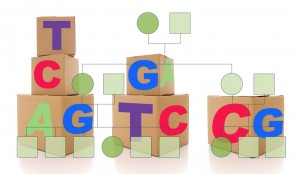Categories: evidence-based medicine, family history, genomics, public health
October 3rd, 2012 11:07 am ET -
Scott Bowen, Office of Public Health Genomics, Centers For Disease Control and Prevention
Karen Greendale, Office of Public Health Genomics, Centers For Disease Control and Prevention
A Working Meeting and an Action Plan
to Save Lives Now
Nearly 2 million Americans are affected by one of three genetic conditions with a strong risk of early morbidity and mortality: BRCA 1/2 and hereditary breast and ovarian cancer; Lynch syndrome and colorectal , endometrial and ovarian cancer; and familial hypercholesterolemia and early cardiovascular events. At present these conditions are poorly identified by the healthcare system but evidence based recommendations are available to prevent disease and improve health.

Opening speaker, Dr. Ursula Bauer Director, NCCDPHP discusses a point later in the day with Dr. Khoury, OPHG Director
On September 7, 2012, eighty experts and stakeholders representing federal, state and local public health agencies, clinicians, key advocates and community leaders came together at CDC’s Roybal headquarters in Atlanta to develop a plan to use evidence based “Tier I” interventions to reduce morbidity and mortality from these three conditions. The event was organized by the CDC Office of Public Health Genomics (OPHG) with help from the University of Michigan Center for Public Health and Community Genomics, Genetic Alliance, and a multi-disciplinary planning committee. The full meeting report is published on the Genomics Forum website and is available for download at http://genomicsforum.org/editoruploads/ActionstoSaveLivesNowReport.pdf
 2 Comments -
Read more
2 Comments -
Read more

Categories: evidence-based medicine, family history, genomics
September 27th, 2012 12:03 pm ET -
Katherine Kolor, Office of Public Health Genomics, Centers for Disease Control and Prevention
Muin J Khoury, Director, Office of Public Health Genomics, Centers for Disease Control and Prevention
 A new podcast from the CDC Expert Commentary Series on Medscape—Family Health History: Use It to Inform Preventive Services for Your Patients— describes how family health history can inform the delivery of preventive health services. The podcast presents three case studies based on recommendations of the US Preventive Services Task Force (USPSTF): screening for lipid disorders in adults, colorectal cancer screening, and BRCA genetic counseling and evaluation. Each case study demonstrates how family health history can be used to define a population subgroup whose increased risk could warrant more intensive preventive intervention. Family health history—which reflects the effects of genetic and environmental risk factors shared within families—has been called the “first genetic test.”
A new podcast from the CDC Expert Commentary Series on Medscape—Family Health History: Use It to Inform Preventive Services for Your Patients— describes how family health history can inform the delivery of preventive health services. The podcast presents three case studies based on recommendations of the US Preventive Services Task Force (USPSTF): screening for lipid disorders in adults, colorectal cancer screening, and BRCA genetic counseling and evaluation. Each case study demonstrates how family health history can be used to define a population subgroup whose increased risk could warrant more intensive preventive intervention. Family health history—which reflects the effects of genetic and environmental risk factors shared within families—has been called the “first genetic test.”
 Post a Comment -
Read more
Post a Comment -
Read more

Categories: family history, genomics
February 23rd, 2012 1:05 pm ET -
Muin J Khoury, Director, Office of Public Health Genomics, Centers for Disease Control and Prevention

When it comes to the use of genomic tests and technologies in practice, Dr Al Berg is a skeptic. Dr Berg is the founding chair of the CDC-sponsored Evaluation of Genomic Applications in Practice and Prevention (EGAPP) Working Group that has been evaluating genomic tests for more than 5 years. He also chaired the National Institutes of Health State-of-the-Science Conference on family history. The EGAPP group has recommended only one genomic test for use in clinical practice among a handful of tests they have assessed so far. The NIH conference found “insufficient evidence” for supporting systematic collection of family history in primary care. Since then, Dr Berg has repeatedly urged caution regarding claims that genetic tests and family history can improve health outcomes.
 3 Comments -
Read more
3 Comments -
Read more

Categories: family history, genomics
December 15th, 2011 12:28 pm ET -
Guest Blogger
Ruta Sharangpani MD, MPH
Bureau of Disease Control Prevention and Epidemiology
Michigan Department of Community Health
Debra Duquette, MS, CGC
Genomics Coordinator
Michigan Department of Community Health
 During the holiday season, many of us will be watching our favorite holiday movies for the umpteenth time. Some of our favorites (according to Gayot, Moviefone and Yahoo are Home Alone, A Christmas Story, A Charlie Brown Christmas, and It’s a Wonderful Life. Most holiday movies seem to have relatives as central characters and family gatherings as a major theme. One of the reasons that holiday movies may be so popular is they remind us of our own wishes and fears.
During the holiday season, many of us will be watching our favorite holiday movies for the umpteenth time. Some of our favorites (according to Gayot, Moviefone and Yahoo are Home Alone, A Christmas Story, A Charlie Brown Christmas, and It’s a Wonderful Life. Most holiday movies seem to have relatives as central characters and family gatherings as a major theme. One of the reasons that holiday movies may be so popular is they remind us of our own wishes and fears.
 1 Comment -
Read more
1 Comment -
Read more

Categories: family history, genomics, heart disease, stroke
October 13th, 2011 11:44 am ET -
Muin J Khoury, Director, Office of Public Health Genomics, Centers for Disease Control and Prevention

In September 2011, the US Department of Health and Human Services announced a new initiative to prevent 1 million heart attacks and strokes in the United States in the next 5 years. This campaign will implement proven, effective, and inexpensive interventions in both clinical and community settings. In clinical practice, it will improve management of the ABCS (aspirin use for high risk patients, blood pressure control, cholesterol management and smoking cessation). In community settings, it will enhance efforts to reduce smoking, improve nutrition and reduce high blood pressure.
 3 Comments -
Read more
3 Comments -
Read more

Categories: family history, genomics, personal genomics
September 8th, 2011 3:03 pm ET -
Muin J Khoury, Director, Office of Public Health Genomics, Centers for Disease Control and Prevention

We thank our readers for their thoughtful comments on our recent post, which discussed the validity and utility of personal genomic tests for improving health. Clearly, this topic engenders a range of reactions as reflected in a recent scientific discussion. Several people I know have sought testing for various reasons, including curiosity, genealogic research, or just for fun. I’ve even been tempted a few times to be tested myself. However, when I looked at the scientific evidence for the accuracy, validity and utility of the information I would receive from such testing for the purpose of improving health and preventing future disease, I decided not to do it–at least not yet. I may change my mind in the future as the science matures. And of course, each person is free to make their own informed decision.
 1 Comment -
Read more
1 Comment -
Read more

Categories: family history, genomics, personal genomics
August 25th, 2011 12:08 pm ET -
Muin J Khoury, Director, Office of Public Health Genomics, Centers for Disease Control and Prevention

Campaigns against public spitting in the 19th century were largely driven by concerns about the spread of tuberculosis. However, at the beginning of the 21st century, spitting seems to be making a comeback. Over the past few years, several companies have begun offering personal genomic tests online to the public. There have been famous images of “spit parties”, where celebrities are seen filling tubes with saliva to ship for DNA testing. Getting information on one’s genes has been promoted as fun, as part of social networking, and as a basis for improving health and preventing disease.
 11 Comments -
Read more
11 Comments -
Read more

Categories: family history, genomics, personal genomics
June 2nd, 2011 1:18 pm ET -
Muin J Khoury, Director, Office of Public Health Genomics, Centers for Disease Control and Prevention
Public health usually works behind the scenes and many people aren’t even aware of public health programs. When you get sick you visit your doctor and get advice and treatment to make you feel better. Doctors and other medical professionals work to improve health one person at a time, but public health professionals focus on improving health at the population level through disease control and prevention. The new field of “public health genomics” is no exception. It focuses on public health policy and programs to make sure that genomic science is used effectively and responsibly to improve the health of all people. Public health genomics seeks to provide policy-makers and the public with unbiased information and services based on scientifically credible genetic information. To illustrate how public health genomics works behind the scenes, we will tell you a made-up story inspired by “A day in the life of public health” published by the El Paso County (Colorado) Department of Health and Environment. We want to make our readers aware of this new field and invite your feedback and comments.
 11 Comments -
Read more
11 Comments -
Read more









